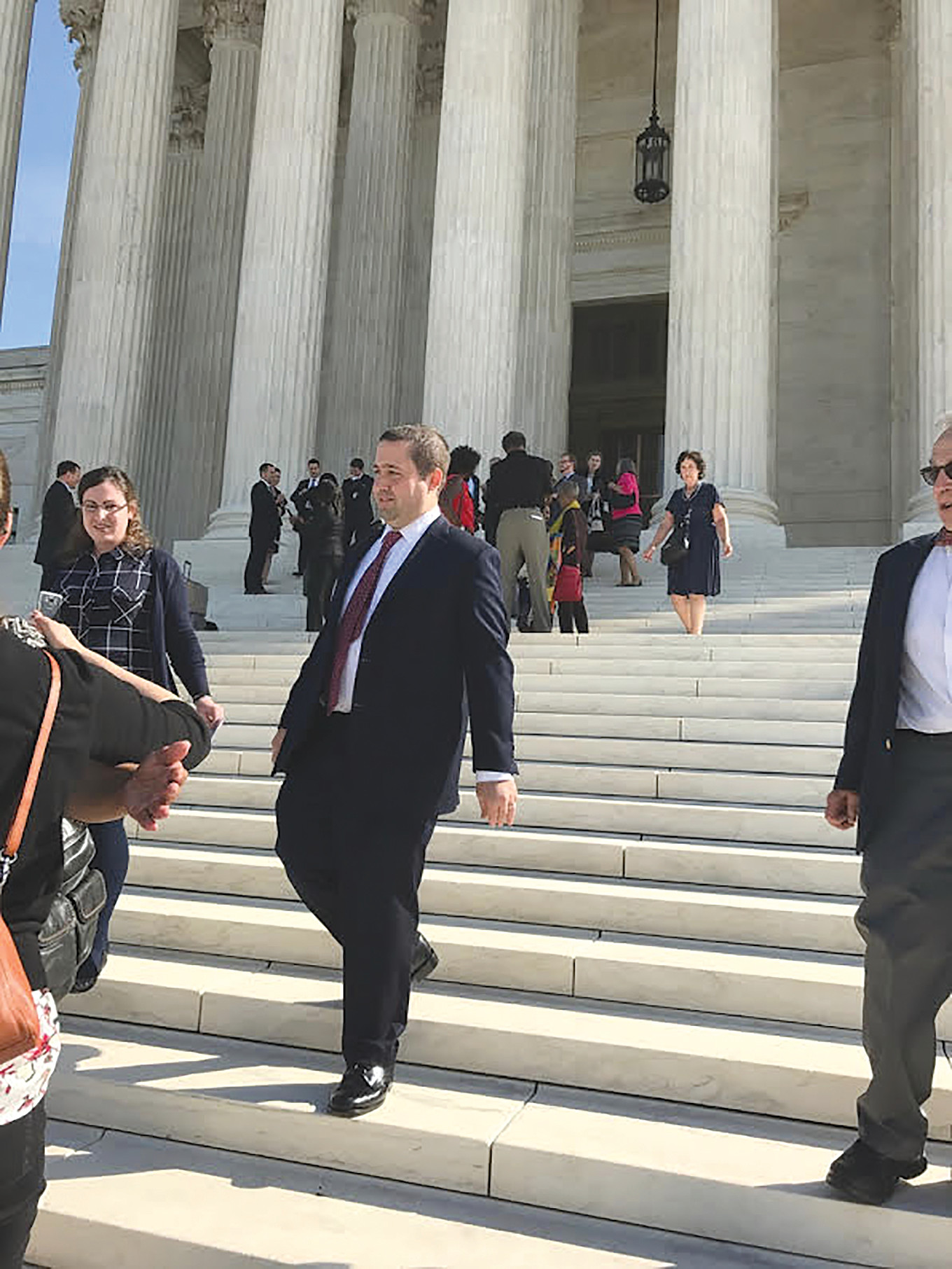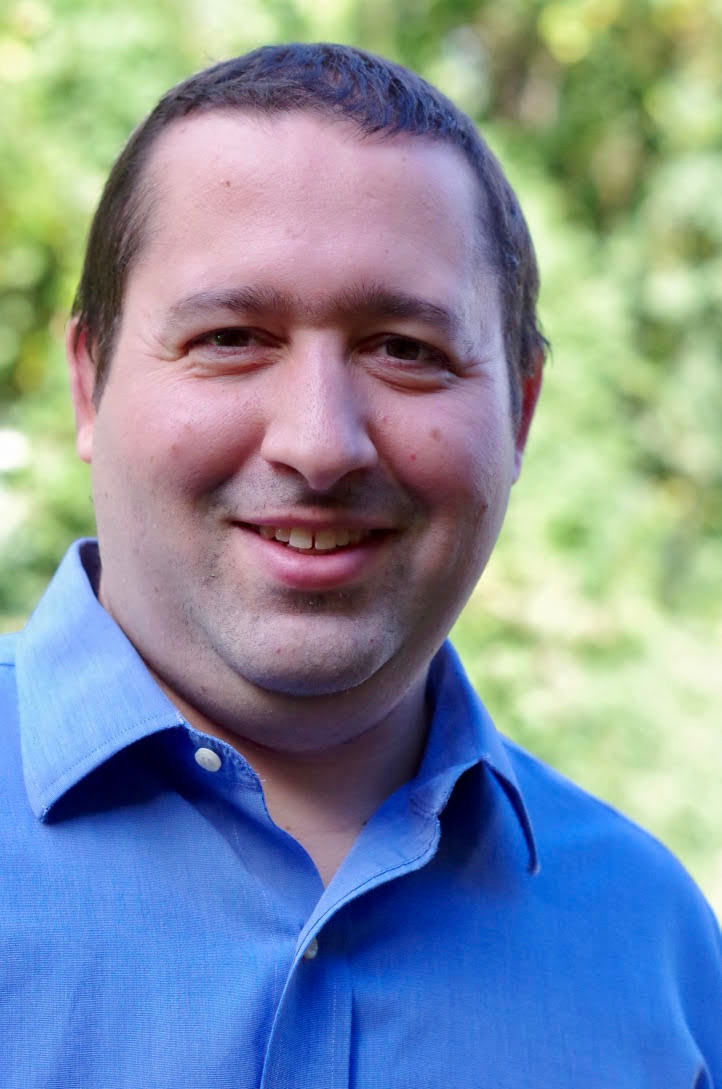- THURSDAY, APRIL 18, 2024
Portsmouth High grad makes his case before nation's highest court
U.S. Supreme Court rules in favor of client represented by Jonathan Herstoff
PORTSMOUTH — Jonathan Herstoff has come a long way since his trombone-playing days at Portsmouth High School, from which he graduated in 2003.
This item is available in full to subscribers.
Please log in to continue |
Register to post eventsIf you'd like to post an event to our calendar, you can create a free account by clicking here. Note that free accounts do not have access to our subscriber-only content. |
Day pass subscribers
Are you a day pass subscriber who needs to log in? Click here to continue.
Portsmouth High grad makes his case before nation's highest court
U.S. Supreme Court rules in favor of client represented by Jonathan Herstoff

Former Portsmouth resident Jonathan A. Herstoff said he hoped to argue before the U.S. Supreme Court again after making his debut in front of the justices in October 2017.
He got his wish.
Mr. Herstoff, a 2003 graduate of Portsmouth High School and now an attorney with Haug Partners in New York, presented argument to the nation’s highest court in “Nutraceutical Corp. v. Lambert, No. 17-1094,” on Nov. 27. He argued on behalf of respondent Troy Lambert.
“The case involves the question of whether the U.S. Court of Appeals for the Ninth Circuit properly entertained an interlocutory appeal in a class action under Federal Rule of Civil Procedure 23(f),” according to Haug Partners’ website.
“Specifically, the court considered whether the Ninth Circuit properly reached the merits of the appeal where a motion for reconsideration of the district court’s decertification order was filed within the time set by the district court, and the petition for permission to appeal was filed 14 days after the district court’s reconsideration order.
“The case presents the question of whether the appeal was timely under the federal rules, and if not, whether equitable exceptions apply that require the appeal to be considered on the merits,” the website stated.
The high court is expected to make a decision on the case by the end of June 2019.
PORTSMOUTH — Jonathan Herstoff has come a long way since his trombone-playing days at Portsmouth High School, from which he graduated in 2003.
A little over a year ago Mr. Herstoff, now an attorney with Haug Partners in New York, successfully argued a pro-bono case before the U.S. Supreme Court, the first time he had ever represented a client in the hallowed halls of justice.
He was just 32.
A lay person may have difficulty making heads or tails of the case. “It’s very technical, but it has some important practical implications,” Mr Herstoff said during a phone interview from his Manhattan office.
It involved an employment discrimination case which his client, Charmaine Hamer, initially lost at trial. Ms. Hamer, a former intake specialist for the Housing Services of Chicago (NHS) and Fannie Mae’s Mortgage Help Center, filed suit against her former employers, alleging violations of the Age Discrimination in Employment Act and Title VII of the Civil Rights Act of 1964. A district court ruled in favor of NHS and Fannie Mae in September 2015.
Ms. Hamer’s attorneys at the time moved to withdraw from the case and asked for a two-month extension for the appeal so she could acquire new counsel, Mr. Herstoff said. The extension was granted by the district court, but Ms. Hamer was unable to find anyone who could affordably represent her, “so she went at it alone,” he said.
The appellate court, however, ruled that even though the district court had granted a two-month extension, the Federal Rules of Appellate Procedure allowed for only a one-month extension. Her appeal was dismissed.
Mr. Herstoff learned of the case on his own while flipping through recent appellate decisions online in an airport, where he was waiting for his wife Emily to return from a trip to Germany. He reached out to Ms. Hamer and asked her if she’d be interested in his firm representing her, pro-bono, before the U.S. Supreme Court. She agreed, and in February 2017 the high court agreed to review the case.
“I did all the research, all the web work and wrote the briefs,” he said.
Trial runs
Now the real work began. To prepare himself for his debut oral argument before the Supreme Court, Mr. Herstoff, a graduate of Franklin Pierce Law Center in Concord, N.H. (now known as the University of New Hampshire School of Law), put himself through a grueling series of practice sessions.
In addition to rehearsing before his colleagues in the Haug Partners practice courtroom, he attended three formal moot courts: at The Benjamin N. Cardozo School of Law in New York City and at Public Citizen Litigation Group and then Georgetown Law School, both in Washington, D.C.
Georgetown is one of the more preeminent places to prepare attorneys for Supreme Court arguments, Mr. Herstoff said.
“It’s first come, first served. Fortunately, I asked them first,” he said. “They have a courtroom that’s set up like the Supreme Court, right down to the carpeting. It’s about a quarter of the size.”
The big day arrived on Oct. 10, 2017 — seven years to the day he and Emily wed. (The couple lives on Long Island.)
“It was a memorable day — arguing before the Supreme Court on my wedding anniversary,” Mr. Herstoff said.
He had plenty of support that day, too. Emily was there, as were his parents, sister (she and her husband flew in from Israel), mother-in-law, friends and co-workers — about a dozen in all. Public seating is limited to about 50 in the courtroom.
“I was able to get some in for reserved seats and others had to wait in line. Fortunately, they all got in,” he said.
Mr. Herstoff was also fortunate in that he’d been in the courtroom before — about five years earlier to attend a patent case. “I worked for a judge down in D.C. when I was in law school. I do patent law for the most part,” he said.
While he was nervous the day before, Mr. Herstoff said that all disappeared on argument day. He soon realized how valuable his preparation for his debut before the highest court had been. “There were really no questions asked that I hadn’t been asked before. It was almost just like having a regular conversation,” he said.
And yes, it’s true the justices constantly pepper — and interrupt — counsel with questions during their arguments. “If you have two questions at once, you try to answer the first one first and hopefully you remember the second one,” he said. “They prepped me for that.”
Know your podium
Mr. Herstoff’s prep work and familiarity with the courtroom came in handy in another way.
“There’s an interesting thing with the podium: It has a crank that raises and lowers it. A telltale sign that someone hasn’t been there before is they don’t know how to work it,” he said.
He made sure he learned how to operate the podium before his argument, however.
“I didn’t want to look like a novice,” he said.
Another thing he found interesting about the experience was the close proximity he had with opposing counsel. “You’re within an arm’s length of them, which is different than what I’m used to,” Mr. Herstoff said, adding that the lectern was also very close to the justices.
About a month after the oral argument, on Nov. 8, 2017, the court issued a unanimous decision in favor of Mr. Herstoff’s client and remanded the case for further proceedings.
“That was extremely exciting,” he said. “The decision was written by Justice Ruth Bader Ginsburg. She’s awesome and has always been my hero.”
His moment in the sun is not lost on Mr. Herstoff, who said he hopes to see the justices again some day.
“It’s not every day you argue before the Supreme Court,” he said. “I would love to go back.”
Other items that may interest you









